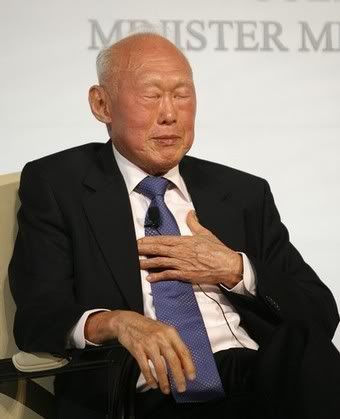<TABLE cellSpacing=0 cellPadding=0 width="100%" border=0><TBODY><TR>Feb 18, 2009
</TR><!-- headline one : start --><TR>Nationalise US banks <!--10 min-->
</TR><!-- headline one : end --><!-- show image if available --><TR vAlign=bottom><TD width=330>

</TD><TD width=10>
 </TD><TD vAlign=bottom>
</TD><TD vAlign=bottom>

Mr Greeenspan said it will be necessary to temporarily nationalise some banks for a swift and orderly restructuring. -- PHOTO: ASSOCIATED PRESS
</TD></TR></TBODY></TABLE>
<!-- START OF : div id="storytext"-->NEW YORK - THE US government may have to temporarily nationalise the country's banks until the sector is reformed, the former chairman of the US Federal Reserve, Alan Greenspan, has said.
In an interview with the Financial Times published on the paper's website on Tuesday, Mr Greeenspan said 'it may be necessary to temporarily nationalise some banks in order to facilitate a swift and orderly restructuring'.
Long one of the world's most powerful proponents of hands-off financial regulation, Mr Greenspan indicated nationalisation may now be necessary.
'I understand that once in a hundred years this is what you do,' he said. Widely hailed while in office, Mr Greenspan has seen his legacy tarnished since he stepped down in 2006, as critics accuse him of failing to head off the current economic malaise.
'In some cases, the least bad solution is for the government to take temporary control,' he said.
Mr Greenspan's call came as President Barack Obama on Tuesday proclaimed he had begun the work of saving the American dream, as he signed into law a historic US$787-billion (S$1.2 trillion) bill designed to rescue the US economy.
But US stocks plunged on fears the mammoth bill, a new plan to tackle mortgage foreclosures expected on Wednesday and a fresh effort to save decrepit US automakers would not be enough to end the worst economic slump since the 1930s.
Mr Obama, on a visit to Colorado, put his name to what he termed the 'most sweeping' recovery package in US history, which cleared Congress less than a month into his presidency, but with negligible Republican support.
'We have begun the essential work of keeping the American dream alive in our time,' Mr Obama said.
The president, who has been warning darkly of economic 'disaster' without quick government action, adopted a more hopeful tone as he signed the bill, which may have deep implications for the success of his presidency. But US stocks plunged as investors worried whether government action would save the ailing economy, with the Dow Jones Industrial Average down 297.41 points (3.79 per cent) to 7,553.00 at the closing bell. -- AFP
</TR><!-- headline one : start --><TR>Nationalise US banks <!--10 min-->
</TR><!-- headline one : end --><!-- show image if available --><TR vAlign=bottom><TD width=330>

</TD><TD width=10>


Mr Greeenspan said it will be necessary to temporarily nationalise some banks for a swift and orderly restructuring. -- PHOTO: ASSOCIATED PRESS
</TD></TR></TBODY></TABLE>
<!-- START OF : div id="storytext"-->NEW YORK - THE US government may have to temporarily nationalise the country's banks until the sector is reformed, the former chairman of the US Federal Reserve, Alan Greenspan, has said.
In an interview with the Financial Times published on the paper's website on Tuesday, Mr Greeenspan said 'it may be necessary to temporarily nationalise some banks in order to facilitate a swift and orderly restructuring'.
Long one of the world's most powerful proponents of hands-off financial regulation, Mr Greenspan indicated nationalisation may now be necessary.
'I understand that once in a hundred years this is what you do,' he said. Widely hailed while in office, Mr Greenspan has seen his legacy tarnished since he stepped down in 2006, as critics accuse him of failing to head off the current economic malaise.
'In some cases, the least bad solution is for the government to take temporary control,' he said.
Mr Greenspan's call came as President Barack Obama on Tuesday proclaimed he had begun the work of saving the American dream, as he signed into law a historic US$787-billion (S$1.2 trillion) bill designed to rescue the US economy.
But US stocks plunged on fears the mammoth bill, a new plan to tackle mortgage foreclosures expected on Wednesday and a fresh effort to save decrepit US automakers would not be enough to end the worst economic slump since the 1930s.
Mr Obama, on a visit to Colorado, put his name to what he termed the 'most sweeping' recovery package in US history, which cleared Congress less than a month into his presidency, but with negligible Republican support.
'We have begun the essential work of keeping the American dream alive in our time,' Mr Obama said.
The president, who has been warning darkly of economic 'disaster' without quick government action, adopted a more hopeful tone as he signed the bill, which may have deep implications for the success of his presidency. But US stocks plunged as investors worried whether government action would save the ailing economy, with the Dow Jones Industrial Average down 297.41 points (3.79 per cent) to 7,553.00 at the closing bell. -- AFP

